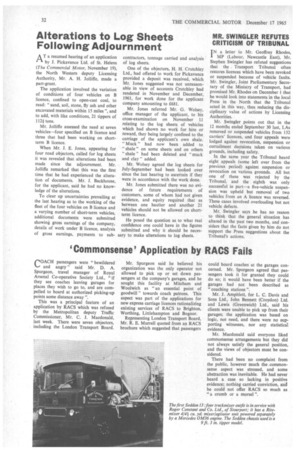'Commonsense' Application by RACS Fails
Page 34

If you've noticed an error in this article please click here to report it so we can fix it.
rOACH passengers were "bewildered 14-, and angry" said Mr. D. A. Spurgeon, travel manager of Royal Arsenal Co-operative Society Ltd., "if they see coaches leaving garages for places they wish to go to, and are compelled to board at authorized picking-up points some distance away ".
This was a principal feature of an application by RACS which was refused by the Metropolitan deputy Traffic Commissioner, Mr. C. J. Macdonald, last week. There were seven objectors, including the London Transport Board. Mr. Spurgeon said he believed his organization was the only operator not allowed to pick up or set down passengers at the company's garages, and he sought this facility at Mitcham and Woolwich as "an essential point of goodwill" towards coach patrons. This aspect was part of the applications for new express carriage licences rationalizing existing services of RACS to Brighton, Worthing, Littlehampton and Bognor.
Representing London Transport Board, Mr. R. E. Murrell quoted from an RACS brochure which suggested that passengers could board coaches at the garages concerned. Mr. Spurgeon agreed that passengers took it for granted they could do so; it would have been better if the garages had not been described as "coaching stations ".
Mr. J. Amphlett, for L. C. Davis and Sons Ltd., John Bennett (Croydon) Ltd. and Lewis (Greenwich) Ltd., said his clients were unable to pick up from their garages; the application was based on logic, not need, and there were no supporting witnesses, nor any statistical evidence.
Mr. Macdonald said everyone liked commonsense arrangements but they did not always satisfy the general position, and the views of objectors must be considered.
There had been no complaint from the public, however much the commonsense aspect was stressed, and some abstraction was inevitable. He had never heard a case so lacking in positive evidence; nothing carried conviction, and he could not offer RACS so much as "a crumb or a morsel ".












































































































